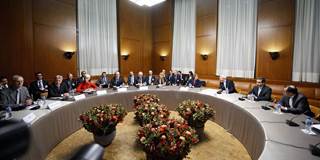The US cannot continue to base its policy toward Iran – a huge country with more than 80 million people, a growing economy, and strong regional influence – on sanctions and vitriol. Instead, it should pursue bilateral negotiations that get to the heart of the mistrust and antagonism between the two countries.
DENVER – US President Donald Trump has decided not to certify that Iran is in compliance with the terms of the Joint Comprehensive Plan of Action (JCPOA), the agreement constraining Iran’s nuclear-weapons program. In effect, Trump has challenged the US Congress to do what is normally the executive branch’s responsibility: create foreign policy.
What that policy will be remains an open question. While Congress is already preparing sanctions, these will not, on their own, comprise a comprehensive Iran strategy. Instead, the US and Iran will need to negotiate directly on a range of non-nuclear issues.
As it stands, few assert that Iran is actually failing to comply with its obligations under the JCPOA. Even US Secretary of State Rex Tillerson, who has made no secret of his disdain for Iran, complains only that Iranian leaders are violating the “spirit” of the deal. But the JCPOA is clearly – and deliberately – focused on curbing Iran’s nuclear-weapons development, not its missile programs, regional ambitions, or animus toward Israel.

DENVER – US President Donald Trump has decided not to certify that Iran is in compliance with the terms of the Joint Comprehensive Plan of Action (JCPOA), the agreement constraining Iran’s nuclear-weapons program. In effect, Trump has challenged the US Congress to do what is normally the executive branch’s responsibility: create foreign policy.
What that policy will be remains an open question. While Congress is already preparing sanctions, these will not, on their own, comprise a comprehensive Iran strategy. Instead, the US and Iran will need to negotiate directly on a range of non-nuclear issues.
As it stands, few assert that Iran is actually failing to comply with its obligations under the JCPOA. Even US Secretary of State Rex Tillerson, who has made no secret of his disdain for Iran, complains only that Iranian leaders are violating the “spirit” of the deal. But the JCPOA is clearly – and deliberately – focused on curbing Iran’s nuclear-weapons development, not its missile programs, regional ambitions, or animus toward Israel.